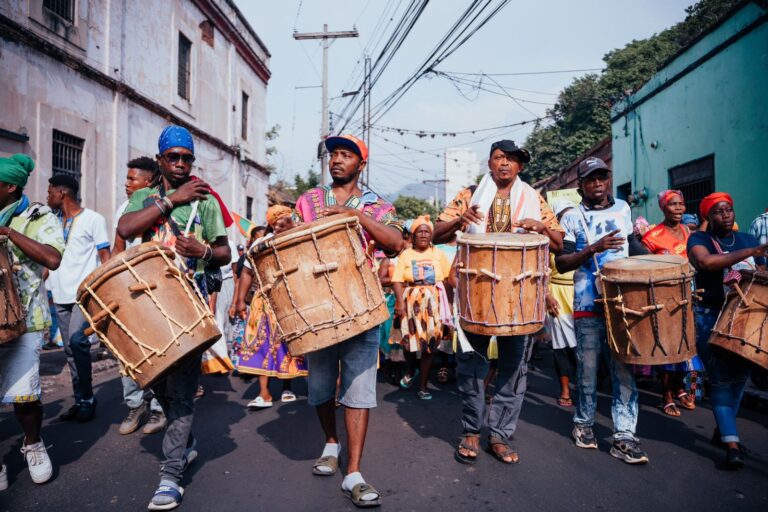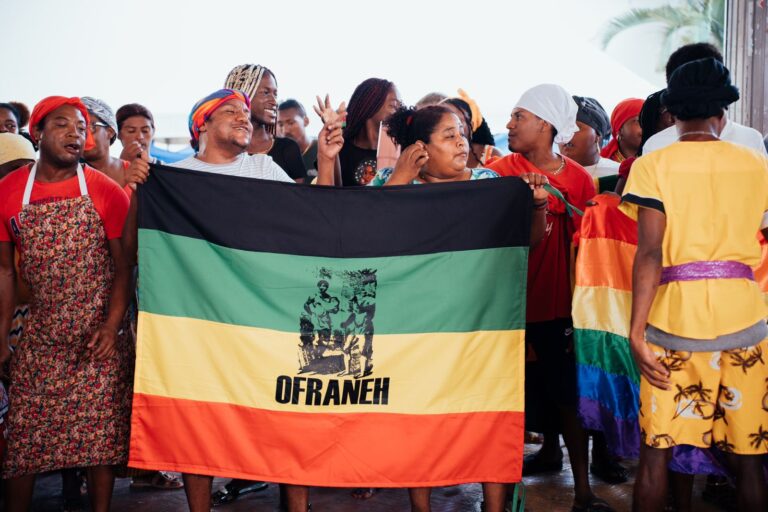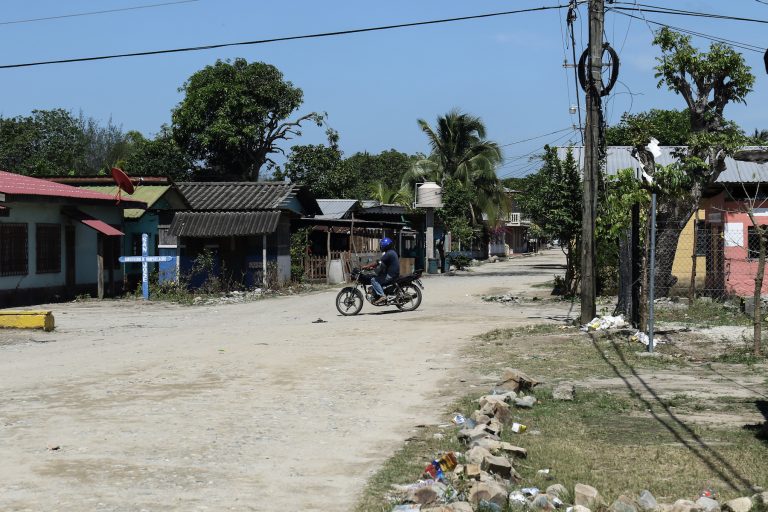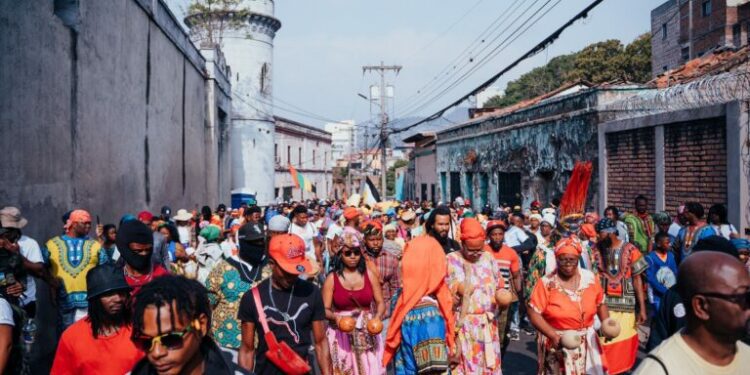The territory has also been infiltrated by criminal groups that transport drugs via the coast. Miranda said this has led to many deaths and has destroyed the social fabric of some communities. It has also тАЬcondemned us to hunger,тАЭ she added, as areas that were previously used for subsistence agriculture have been taken over for the cultivation and production of coca and other drugs. тАЬEvery day, we are fighting to survive in a country totally captured by drug mafias.тАЭ
Garifuna leaders and human rights organizations, such as OFRANEH, have denounced the Honduran state for selling their ancestral lands to private developers, agribusiness and drug traffickers without their consent and argue that the government has failed to recognize, respect or protect their fundamental rights.
A favorable ruling, ignored
For almost two decades, Garifuna leaders with the support of OFRANEH have filed complaints about rights violations that have taken place on their lands. In 2003, after years of filinglawsuits in national courts to no avail, they took the issue to the Inter-American Court of Human Rights, тАЬto demand respect for our territories and our lives,тАЭ Miranda told Mongabay.
On Oct. 8, 2015, the Inter-American Court ruled that the Honduran government had violated the rights of the Garifuna communities of Triunfo de la Cruz in Atl├бntida and Punta Piedra in Col├│n and ordered the restitution of land rights to the communities. A third sentence was delivered in 2023 for damages to the community of San Juan in Atl├бntida. But it has been almost 10 years since the first ruling and the government has not yet complied with sentences.
тАЬThis is one weakness of this international court,тАЭ Castillo told Mongabay over the phone. тАЬIt does not have a coercive body that can sanction the state if it does not comply.тАЭ
Property titles on Garifuna land have continued to be sold to private investors, such as the owners of the Rosa Negra tourist complex, who have been accused of harassing and threatening Garifuna leaders, according to a public statement signed by the Washington Office on Latin America and 12 other international organizations. Groups aligned with Rosa Negra reportedly barred the entrance to the Triunfo de la Cruz community and launched a smear campaign тАЬaimed at generating divisions among the community,тАЭ the statement said. The owners of Rosa Negra did not respond to MongabayтАЩs requests for comment.
 Garifuna peoples carry out a march in the capital city of Honduras, demanding the state comply with a 2015 international court sentence that ordered the restitution of land rights to the communities. Image courtesy of Carlos Ortiz.
Garifuna peoples carry out a march in the capital city of Honduras, demanding the state comply with a 2015 international court sentence that ordered the restitution of land rights to the communities. Image courtesy of Carlos Ortiz.
In April, after members of the Garifuna community and OFRANEH formed a protest in the countryтАЩs capital and a three-day encampment outside the Presidential Palace of Honduras, a high-level commission was formed to ensure compliance with the international court sentences. It is headed by the Honduran Foreign Ministry and is made up of several government institutions, such as the National Agrarian Institute and the Secretariat of Human Rights, as well as members of OFRANEH and community members from Triunfo de la Cruz, Punta Piedra and San Juan.
тАЬAt the moment, we are holding several meetings to define the route of compliance with the sentences,тАЭ Miranda told Mongabay. But two parallel community boards, or patronatos, which are community associations that allow members to self-manage and defend their needs and interests, have been created by private investors and other non-Afro-Indigenous settlers, with support from the mayor of Tela and the municipal government of Traves├нa, where another Garifuna community lives. According to Jalileh Garc├нa from the Witness for Peace Solidarity Collective, a workersтАЩ organization that focuses on peace and justice in Latin America, the goal is to block state efforts to comply with the 2015 international court ruling.
Both the mayor of Tela and the Puerto Cort├йs government did not respond to MongabayтАЩs requests for comment. Meanwhile, leaders and community members continue to face an increase in threats, criminalization and violence by Honduran military forces and police who provide security to non-Afro-Indigenous settlers.
Community threats
Since 2018, more than 150 Garifuna peoples have been killed, 37 criminalized and five forcibly displaced. In 2023, four Garifuna leaders were murdered, including Mart├нn Morales Mart├нnez, a member of the commission set up to ensure the state complies with the 2015 Inter-American Court ruling. Morales was also a part of the Committee for the Defense of the Land in Triunfo de la Cruz. Earlier, in 2020, four Garifuna leaders had disappeared after a group of 30 heavily armed men in police uniforms were seen entering their homes. These leaders were never seen again.
 Garifuna peoples, along with the Black Fraternal Organization of Honduras (OFRANEH), march toward the Presidential Palace of Honduras on April 12 to demand a high-level commission to ensure compliance with a 2015 international court sentence. Image courtesy of Carlos Ortiz.
Garifuna peoples, along with the Black Fraternal Organization of Honduras (OFRANEH), march toward the Presidential Palace of Honduras on April 12 to demand a high-level commission to ensure compliance with a 2015 international court sentence. Image courtesy of Carlos Ortiz.
Castillo has been arrested тАЬmany times,тАЭ and he told Mongabay the police frequently monitor his movements and try to intimidate him. Castillo said his mother and sister have also received death threats. Miranda has also been arrested and threatened on several occasions, such as in September last year, when four unknown men with assault rifles entered her home in Vallecito. The men fled after a confrontation with MirandaтАЩs security team.
 The Garifuna community of Triunfo de la Cruz. Image by Christopher Clark for Mongabay.
The Garifuna community of Triunfo de la Cruz. Image by Christopher Clark for Mongabay.
According to Miranda, ever since the court sentences, racism toward Garifuna peoples has increased. On June 24 and 26, the Honduran police and military raided the community of Trujillo and tried to evict and imprison Garifuna residents. The police were reportedly sent to protect the interests of Randy Jorgensen, Malik Zoharan and Darren Wade, three Canadian tourist investors charged with money laundering and fraud relating to sales of Garifuna lands earlier this year. тАЬThe police act in favor of the businessmanтАЩs principals,тАЭ Castillo explained.
The Honduran military, National Police and Directorate of Police Disciplinary Affairs did not respond to any of MongabayтАЩs requests for comment.
тАЬAll we want is to live in peace,тАЭ Miranda said. тАЬWe want a future for our youth and for our youth to not leave; for them to have the ability to survive here. We have the right to that.тАЭ
Banner image: Protesters marching to the Presidential Palace in Tegucigalpa. Photo courtesy of Carlos Ortiz.
Related reading
Honduran environmental defenders hit hard by human rights crisis, report says
FEEDBACK: Use this┬аform┬аto send a message to the author of this post. If you want to post a public comment, you can do that at the bottom of the page.
Biodiversity, Community Development, Development, Human Rights, Indigenous Communities, Indigenous Groups, Indigenous Peoples, Indigenous Rights, Infrastructure, Land Conflict, Land Grabbing, Land Rights, Law
Central America, Honduras, Latin America
Source link : https://news.mongabay.com/2024/07/garifuna-land-rights-abuses-persist-in-honduras-despite-court-ruling/
Author :
Publish date : 2024-07-17 06:51:04
Copyright for syndicated content belongs to the linked Source.












